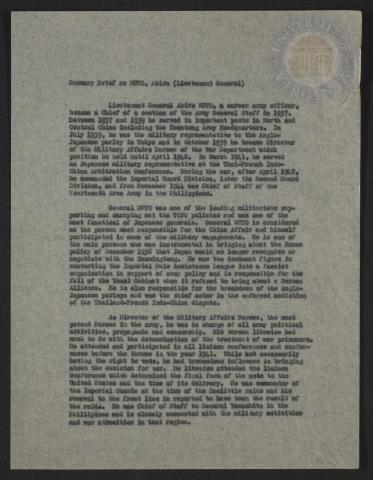
Page 1
| Parent | Summary Brief about Akira Muto |
|---|---|
| Date | |
| Language | English |
| Collection | Roy L. Morgan Papers |
| Box | Box 3 |
| Folder | 1946 [IMFTE] (IPS) Translations of interrogations. |
| Repository | University of Virginia Law Library |
Summary Brief re MUTO, Akira (Lieutenant General)
Lieutenant General Akira MUTO, a career army officer, became a Chief of a section of the Army General Staff in 1937. Between 1937 and 1939 he served in important posts in North and Central China including the Kwantung Army Headquarters. In July 1939, he was the military representative to the Anglo-Japanese parley in Tokyo and in October 1939 he became Director of the Military Affairs bureau of the War Department which position he held until April 1942. In March 1941, he served as Japanese military representative at the Thai-French Indo-China Arbitration Conference. During the war, after April 1942, he commanded the Imperial Guard Division, later the Second Guard Division, and from November 1944 was Chief of Staff of the Fourteenth Area Army in the Philippines.
General MUTO was one of the leading militarists supporting and carrying out the TOJO policies and was of the most fanatical of Japanese generals. General MUTO is considered as the person most responsible for the China Affair and himself participated in some of the military engagements. He is one of the main persons who was instrumental in bringing about the Konoe policy of December 1938 that Japan would no longer recognize or negotiate with the Kuomingtang. He was the dominant figure in converting the Imperial Rule Assistance League into a fascist organization in support of army policy and is responsible for the fall of the Yonai Cabinet when it refused to bring about a German Alliance. He is also responsible for the breakdown of the Anglo-Japanese parleys and was the chief actor in the enforced mediation of the Thailand-French Indo-China dispute.
As Director of the Military Affairs Bureau, the most potent Bureau in the army, he was in charge of all army political activities, propaganda and censorship. His bureau likewise had much to do with the determination of the treatment of war prisoners. He attended and participated in all liaison conferences and conferences before the throne in the year 1941. While not necessarily having the right to vote, he had tremendous influence in bringing about the decision for war. He likewise attended the liaison conference which determined the final form of the note to the United States and the time of its delivery. He was commander of the Imperial Guards at the time of the Doolittle raids and his removal to the front line is reported to have been the result of the raids. HE was Chief of Staff to General Yamashita in the Philippines and is closely connected with the military activities and war atrocities in that region.
